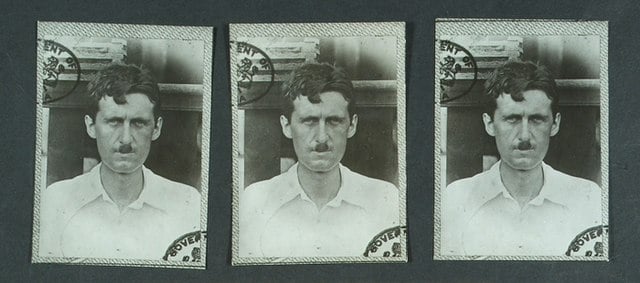Within the last year there have been countless new books on George Orwell, but Oliver Lewis’s The Orwell Tour, just released in paperback, is the most accessible and enjoyable of them all. Lewis writes in a crisp and evocative style (I can still see in my mind’s eye the Martian dust of Marrakech and the architecture and landscape of Huesca); and he has Orwell’s own gift for fresh similes (on a bus “it was as if the passengers were coins in a tin can being rattled”; in Burma he finds “a crumbling church tower, as if copied and pasted from Surrey”). The result is a book which, even without the Orwell element, would remain a first-rate piece of travel writing.
Orwell had an extremely productive life in which, aside from writing enough novels and essays and letters to fill twenty thick volumes, he travelled very widely. He was born in India, educated at Eton, lived among miners in Wigan and beggars in London and Paris, served as a policeman in Burma and a soldier in Spain. Lewis handles every location with expertise. He is not just a travel writer, but a novelist, a humourist, and a historian.
Like Evelyn Waugh, a contemporary of Orwell’s and a former contributor to Cherwell who wrote a number of amusing travelogues, Lewis makes his travels more fun to read about by recording a number of humorous interactions with locals. There is an incident that stands out involving an octogenarian monk in Burma. Lewis approaches him and asks for a photograph. “He replied: ‘Mannay?’ I answered that I had paid my entrance fee, but he snapped back: ‘No mannay? Get out!’” At another point Lewis meets a woman who complains to him that, on ships, dogs are always taken down first: “They’re treating them like animals. It’s disgusting.”
Lewis manages seamlessly to blend anecdotes and local colour with history and biography. In the chapter on Burma, he gives an overview of the country’s history since Orwell’s days, and this historical coverage flows perfectly with all else around it, where in less competent hands it would have come through as a tacked-on digression. Some of the accounts of local folklore are also very good, e.g. the legend of Jack of Southwold.
There is some literary criticism here, too, but it never overbears and is always interesting. Lewis belongs to that school of Orwell scholars which seeks to rescue his dullest novel, A Clergyman’s Daughter, from what E.P. Thompson called the condescension of posterity; an intriguing parallel is drawn between that novel and The Power and the Glory by Graham Greene (yet another Cherwell alumnus – we’re on a roll this week). If anything, these snippets of literary criticism are too brief, although those who want more such can always console themselves with a copy of Orwell: The New Life or the latest issue of George Orwell Studies.
Lewis does his best with the less interesting sites of Orwell’s life, and the quality of writing and research never falters. Orwell had lived for some time in some quite full places, like Hayes, of which he gave a laser-accurate description as “one of the most godforsaken places I have ever struck”. Henley-upon-Thames, the town of his childhood, is green and pleasant, though it is more worth reading about for the charm of the Edwardian setting than the charm of the place itself.
The book also benefits from small details of niche interest. Lewis, like Orwell, is something of a bibliophile, and he has an extraordinary eye for bookshops in all the places he has visited. “It is hard to resist visiting any bookshop in the vicinity of somewhere with Orwellian credentials.” It is interesting to read a description of a tucked-away library in India where books in English have gone utterly unborrowed since the 1950s, remaining as a sort of shelved tomb for the British Raj. Some of Lewis’s observations defy categorisation but remain amusing and thought-provoking: in Marrakech he reflects that former French colonies have better hotel breakfasts than former British ones.
If at times Lewis tries too hard to be accessible (i.e. explaining about how public schools are not really public), that is compensated for by the fact that everyone can read this book. Lewis succeeds admirably in everything that he aims to do, and his infectious enthusiasm for his subject shines through in every line. Whether you are interested in travel or literature or history or biography, this is definitely a book to read – as, I am sure, will be his upcoming book on travels through the life and work of John Steinbeck.
Oliver Lewis’s book The Orwell Tour is now available in paperback from Blackwell’s, Waterstones, and Gulp Fiction. You can find my interview with Oliver Lewis here: [weblink/page number]


